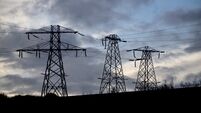Eamon Ryan: Windfall tax will be used to protect energy consumers from high prices

Eamon Ryan said the tax will “claw back” excess profits from energy-generating companies who are not using gas. Photo: Gareth Chaney/ Collins Photos
Ireland could collect anywhere from €340 million to €1.9 billion from a windfall tax and solidarity contribution from energy providers, money which the energy minister says will be used to "protect" consumers.
Cabinet on Tuesday signed off measures including a cap on all market revenue on non-gas electricity generators, and a temporary solidarity contribution for companies active in fossil fuel production.













